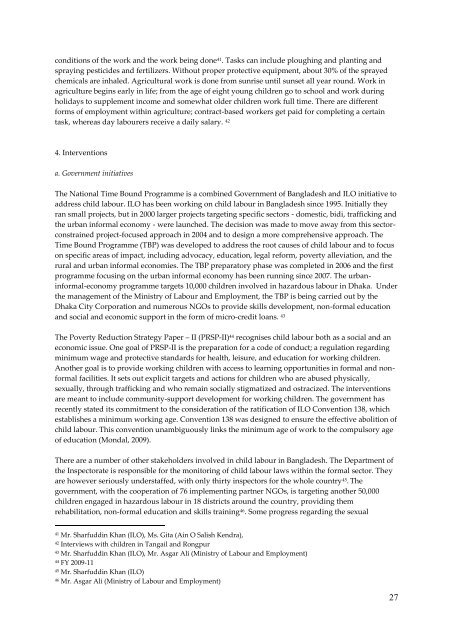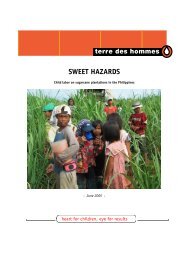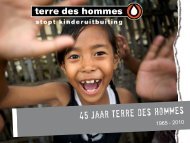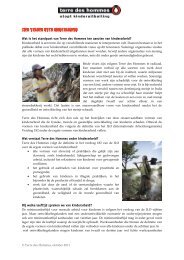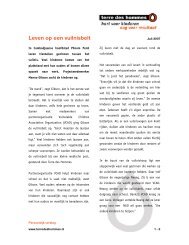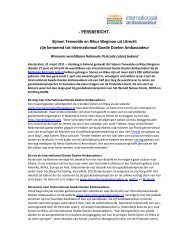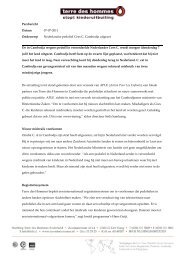Untitled - Terre des Hommes
Untitled - Terre des Hommes
Untitled - Terre des Hommes
- No tags were found...
Create successful ePaper yourself
Turn your PDF publications into a flip-book with our unique Google optimized e-Paper software.
conditions of the work and the work being done 41 . Tasks can include ploughing and planting and<br />
spraying pestici<strong>des</strong> and fertilizers. Without proper protective equipment, about 30% of the sprayed<br />
chemicals are inhaled. Agricultural work is done from sunrise until sunset all year round. Work in<br />
agriculture begins early in life; from the age of eight young children go to school and work during<br />
holidays to supplement income and somewhat older children work full time. There are different<br />
forms of employment within agriculture; contract-based workers get paid for completing a certain<br />
task, whereas day labourers receive a daily salary. 42<br />
4. Interventions<br />
a. Government initiatives<br />
The National Time Bound Programme is a combined Government of Bangla<strong>des</strong>h and ILO initiative to<br />
address child labour. ILO has been working on child labour in Bangla<strong>des</strong>h since 1995. Initially they<br />
ran small projects, but in 2000 larger projects targeting specific sectors - domestic, bidi, trafficking and<br />
the urban informal economy - were launched. The decision was made to move away from this sectorconstrained<br />
project-focused approach in 2004 and to <strong>des</strong>ign a more comprehensive approach. The<br />
Time Bound Programme (TBP) was developed to address the root causes of child labour and to focus<br />
on specific areas of impact, including advocacy, education, legal reform, poverty alleviation, and the<br />
rural and urban informal economies. The TBP preparatory phase was completed in 2006 and the first<br />
programme focusing on the urban informal economy has been running since 2007. The urbaninformal-economy<br />
programme targets 10,000 children involved in hazardous labour in Dhaka. Under<br />
the management of the Ministry of Labour and Employment, the TBP is being carried out by the<br />
Dhaka City Corporation and numerous NGOs to provide skills development, non-formal education<br />
and social and economic support in the form of micro-credit loans. 43<br />
The Poverty Reduction Strategy Paper – II (PRSP-II) 44 recognises child labour both as a social and an<br />
economic issue. One goal of PRSP-II is the preparation for a code of conduct; a regulation regarding<br />
minimum wage and protective standards for health, leisure, and education for working children.<br />
Another goal is to provide working children with access to learning opportunities in formal and nonformal<br />
facilities. It sets out explicit targets and actions for children who are abused physically,<br />
sexually, through trafficking and who remain socially stigmatized and ostracized. The interventions<br />
are meant to include community-support development for working children. The government has<br />
recently stated its commitment to the consideration of the ratification of ILO Convention 138, which<br />
establishes a minimum working age. Convention 138 was <strong>des</strong>igned to ensure the effective abolition of<br />
child labour. This convention unambiguously links the minimum age of work to the compulsory age<br />
of education (Mondal, 2009).<br />
There are a number of other stakeholders involved in child labour in Bangla<strong>des</strong>h. The Department of<br />
the Inspectorate is responsible for the monitoring of child labour laws within the formal sector. They<br />
are however seriously understaffed, with only thirty inspectors for the whole country 45 . The<br />
government, with the cooperation of 76 implementing partner NGOs, is targeting another 50,000<br />
children engaged in hazardous labour in 18 districts around the country, providing them<br />
rehabilitation, non-formal education and skills training 46 . Some progress regarding the sexual<br />
41<br />
Mr. Sharfuddin Khan (ILO), Ms. Gita (Ain O Salish Kendra),<br />
42<br />
Interviews with children in Tangail and Rongpur<br />
43<br />
Mr. Sharfuddin Khan (ILO), Mr. Asgar Ali (Ministry of Labour and Employment)<br />
44<br />
FY 2009-11<br />
45<br />
Mr. Sharfuddin Khan (ILO)<br />
46<br />
Mr. Asgar Ali (Ministry of Labour and Employment)<br />
27


